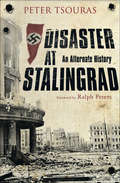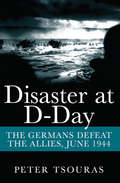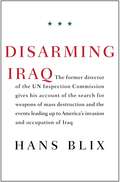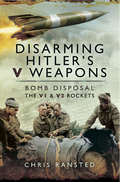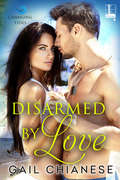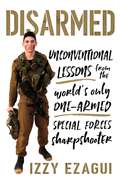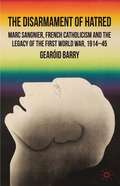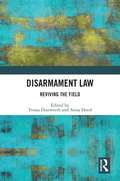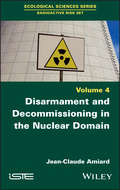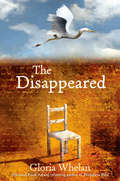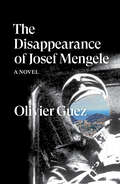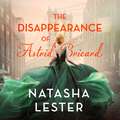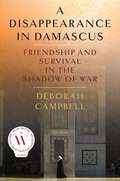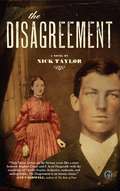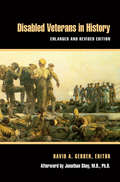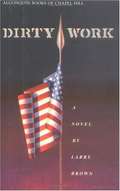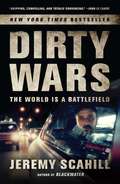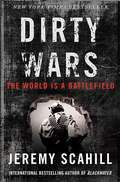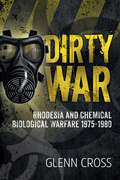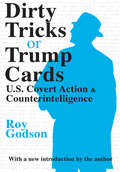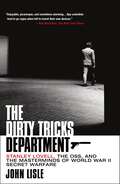- Table View
- List View
Disaster at Stalingrad: An Alternate History
by Peter TsourasA fascinating &“what if&” history of one of World War II&’s most iconic battles. It is early September 1942 and the German commander of the Sixth Army, General Paulus, assisted by the Fourth Panzer Army, is poised to advance on the Russian city of Stalingrad. His primary mission was to take the city, crushing this crucial center of communication and manufacturing, and to secure the valuable oil fields in the Caucasus. What happens next is well known to any student of modern history: a brutal war of attrition, characterized by fierce hand-to-hand combat, that lasted for nearly two years, and the eventual victory by a resolute Soviet Red Army. A ravaged German Army was pushed into full retreat. This was the first defeat of Hitler&’s territorial ambitions in Europe and a critical turning point of World War II. But the outcome could have been very different, as Peter Tsouras demonstrates in this fascinating alternate history of this fateful battle. By introducing minor—and realistic— adjustments, Tsouras presents a scenario in which the course of the battle runs quite differently, which in turn throws up disturbing possibilities regarding the outcome of the whole war.
Disaster at D-Day: The Germans Defeat the Allies, June 1944 (Military Paperbacks Ser.)
by Peter TsourasThe editor of Hitler Triumphant combines history and fiction to craft an alternative history of the Normandy landings on D-Day. It is June, 1944. The Allied armies are poised for the full-scale invasion of Fortress Europe. Across the Channel, the vaunted Wehrmacht lies waiting for the signs of invasion, ready for the final battle . . . What happens next is well-known to any student of modern history. The outcome could easily have been very different, as Peter Tsouras shows in this masterful and devastating account in which plans, missions, and landings go horribly wrong. Tsouras firmly bases his narrative on facts but introduces minor adjustments at the opening of the campaign—the repositioning of a unit, bad weather and misjudged orders—and examines their effect as they gather momentum and impact on all subsequent events. Without deviating from the genuine possibilities of the situation, he presents a scenario that keeps the reader guessing and changes the course of history.Praise for Disaster at D-Day&“A brilliant and interesting book. The author has pulled off a great feat of imagination and research.&” —Military Illustrated&“This should find a place on the shelves of anyone with an interest in the period and would be invaluable background reading in preparation for a battlefield tour of Normandy.&” —The British Army Review
Disarming Iraq
by Hans BlixHans Blix recounts the events leading up to the declaration of war on Iraq in March 2003, looking back to Saddam Hussein's long wrangle with the international community since the first Gulf War and forward to the implications for international security in the aftermath of the war just ended. In clear-eyed descriptions of his meetings with Blair, Bush, Chirac, Cheney, Condoleezza Rice, Colin Powell and Kofi Annan, he conveys the frustrations, the tensions, the pressure and the drama of the months leading up to the US/UK-led attack on Iraq. He also asks and answers key questions including: Could the war have been prevented? Was it inevitable? Does Iraq have weapons of mass destruction? Why couldn't the US and the UK secure the backing of the member states of the UN Security Council? And: What can be learnt from the Iraq war for the prevention of the spread and use of WMDs in the future?
Disarming Hitlers V Weapons: Bomb Disposal, the V1 and V2 rockets
by Chris RanstedAn account of the &“brave men of the bomb disposal units who died disarming the weapons that Hitler hoped would save the Nazis from defeat&” (Dover Express/Folkestone Herald). In 1944 the V-1s and V-2s, Hitler&’s &“vengeance&” weapons, were regarded by the Allied leaders in London as the single greatest threat they had faced. It was feared that these flying bombs and rockets might turn the tide of war once again in Germany&’s favor. Yet, little more than half of these missiles hit their targets, some failing to explode. Their wreckage lay across the southern half of England or in Europe, with contents liable to sudden and deadly ignition. It was the job of specialist Bomb Disposal teams to render the V-weapons safe and uncover their secrets. This is their story. In this unique book Chris Ransted has investigated the work of these unsung heroes who risked their lives every time they were called into action and, in the course of his research he has located the sites of many of the unexploded V-weapons, revealed here for the first time. Ransted also details the methods used by the Bomb Disposal men and the equipment they used. The book is richly illustrated with 266 photographs and diagrams, many of which have never previously been published. In completing this, the most comprehensive study of its kind, the author describes the deeds of those gallant Bomb Disposal men that were awarded one of the highest honors which could have been bestowed upon them by their country—the George Medal. &“A particularly thorough and enlightening book.&”—Military Vehicle Trust
Disarmed by Love (Changing Tides #3)
by Gail ChianeseA Navy man with a damaged past. A beautiful woman enlisted to help him. Falling in love is the healing they both need. But it comes with a risk neither expected . . . When Fiona Sinclair’s reckless ex-husband piles on the anxiety, the resilient single mom has the perfect outlet: her days spent whipping Navy men into shape through yoga, meditation, and—as one of her new students puts it—“all that New Age crap.” For seventeen years, Lieutenant Dante Torres disarmed explosives. Stress level: over the top. Then one wrong move scrambled his brain. But nothing compares to dealing with a no-nonsense pint-sized fireball like Fiona. He has to admit, she’s working wonders. In more ways than one. As things warm between them, Dante even discovers he can be of help to her: by becoming best buddy to her troubled young son. But when the boy’s father pushes for custody, everything Fiona’s worked so hard for is thrown into jeopardy, including her relationship with Dante. Now it’s going to take all her resolve to fight back—for herself, her son, and the man she loves.
Disarmed: Unconventional Lessons from the World's Only One-Armed Special Forces Sharpshooter
by Izzy EzaguiThe inspiring story of a young American who volunteered to fight in the Israel Defense Forces, lost his arm in combat, and then returned to the battlefield.Combining refreshing candor with self-deprecating wit, this inspiring memoir will encourage readers to live up to their aspirations despite seemingly impossible odds.On January 8, 2009, Izzy Ezagui--an American who had enlisted in the Israel Defense Forces (IDF) at nineteen--lost his arm in a mortar attack on the border of the Gaza Strip. In this stirring and wryly humorous memoir, Izzy recounts his tortuous trek through rehabilitation to re-enlistment as a squad commander in the IDF. He became the world's only one-armed Special Forces sharpshooter.This isn't a typical war chronicle, full of macho bluster and the usual hero tropes. Izzy wrote this book with his fellow millennials in mind--not necessarily those with military ambitions, but everyone facing life's daily battles. His message is universal: if a self-described "nerd" and "one-armed basket case" like him can accomplish what he set his mind to, then anyone can become a hero in his or her own life.Growing up in a religious household in Miami, Izzy's early life was plagued by self-doubt, family drama, and (far too few) girl troubles. His search for direction eventually led him to that explosion on the Gaza border, changing his life forever.In the midst of disaster, Izzy discovered a deep well at his core, from which he could draw strength. Through his motivational speeches across the world, and now through this book, he encourages people to seek their own power, and to face whatever adversity life throws at them.
The Disarmament of Hatred: Marc Sangnier, French Catholicism and the Legacy of the First World War, 1914–45
by Gearóid BarryDocumenting an audacious Franco-German movement for moral disarmament, instigated in 1921 by war veteran and French Catholic politician Marc Sangnier, in this transnational study Gearóid Barry examines the European resonance of Sangnier's Peace Congresses and their political and religious ecumenism within France in the era of two World Wars.
Disarmament Law: Reviving the Field
by Treasa DunworthThis volume seeks to start a revival of the field of disarmament law scholarship. Law is a fundamental component of disarmament, yet today, most perspectives on the wide range of disarmament issues that exist come primarily from political, diplomatic and public advocacy angles. The aim of this book is to revive the field of disarmament law building on earlier, important and still relevant contributions by international lawyers to the subject. The collection brings together international scholars on various aspects of disarmament. The contributions range across a variety of weapons types, adopt different approaches - doctrinal, historical and critical - to the issues being discussed and taken together, constitute a snapshot of the ideas, concerns and issues that currently occupy disarmament law scholars. The book will be essential reading for academics, researchers and policy-makers working in the area of disarmament.
Disarmament and Decommissioning in the Nuclear Domain
by Jean-Claude AmiardFollowing the acquisition of the atomic bomb by five states, the United Nations began drafting several treaties to limit nuclear proliferation. These efforts failed, as four more states also acquired nuclear weapons. In a similar vein, an attempt to limit atomic weapons - primarily within the two superpowers - was initiated.While the number of weapons has decreased, the new bombs now being manufactured are more powerful and more precise, negating any reduction in numbers. In the field of civil nuclear use, all nuclear facilities (reactors, factories, etc.) have a limited lifespan. Once a plant is permanently shut down, these facilities must be decommissioned and dismantled.These operations are difficult, time-consuming and costly. In addition, decommissioning generates large volumes of radioactive waste of various categories, including long-lived and high-activity waste. Risks to the environment and to health are not negligible during decommissioning. The International Atomic Energy Agency (IAEA) and the Nuclear Energy Agency (NEA) of the Organisation for Economic Co-operation and Development (OECD) have produced numerous publications with recommendations. Each state has its own decommissioning strategy (immediate or delayed) and final plan for the site - whether it be returning it to greenfield status or obtaining a nuclear site license with centuries-long monitoring.
The Disappeared
by Gloria WhelanA riveting tale about love and sacrifice by a National Book Award winner. The Disappeared. Los desaparecidos. This is the name given to those who opposed Argentina's dictatorial government and were kidnapped to ensure their silence. With her hometown of Buenos Aires ensconsced in the political nightmare, Silvia devises a plan to save her missing brother. She'll make Norberto, son of the general who arrests dissenters, fall in love with her-and he'll have his father set Eduardo free. Told in alternating chapters, this powerful and poetic story follows Silvia as she spirals into Norberto's world, and Eduardo as he struggles to endure physical and emotional torture. Will Silvia's scheme reunite her family? Or will the pursuit of freedom cost these devoted siblings their lives?
The Disappearance of Josef Mengele: A Novel
by Olivier GuezAn extraordinary novel about one of history&’s most reviled figures, written as an action-packed historical biographyFor three decades, until the day he collapsed in the Brazilian surf in 1979, Josef Mengele, the Angel of Death who performed horrific experiments on the prisoners of Auschwitz, floated through South America in linen suits, keeping two steps ahead of Mossad agents, international police and the world&’s journalists. In this rigorusly researched factual novel—drawn almost entirely from historical documents—Olivier Guez traces Mengele&’s footsteps through these years of flight. This chilling novel situates the reader in a literary manhunt on the trail of one of the most elusive and evil figures of the twentieth century.
The Disappearance of Astrid Bricard: a captivating story of love, betrayal and passion from the author of The Paris Secret
by Natasha Lester'Vogue meets Daisy Jones & The Six . . . Natasha Lester's most compelling novel yet!' - Kate Quinn, author of, The Rose Code'Brave, bold, and beautiful . . . I couldn't stop reading' - Kerri Maher, author of, The Paris Bookseller'Natasha Lester at her best!' - Chanel Cleeton, author of, Next Year in HavanaIn November 1973, a legend vanished, leaving behind only a white silk dress and the question: what happened to Astrid Bricard?1917. Parentless, sixteen-year-old Mizza Bricard, at a party surrounded by the most scandalous women in Paris - including Coco Chanel - sees what society expects of a woman alone in the world. That night, she vows to never be gossiped about because of who has paid for her pearls, a vow that drives her through decades and couture houses until finally her name is remembered and a legend created.1970. Astrid Bricard arrives in New York determined to change the fashion world forever. But when she meets fellow designer Hawk Jones and they embark on a passionate love affair, she finds herself cast in the role of muse, her own talent ignored. Then comes the Battle of Versailles, a competition between American and French designers which marks the making of Hawk's career, and the end of Astrid Brichard.Present Day. Blythe Bricard is determined not to be anyone's muse - even if that means turning her back on her own designing dreams. Until she's invited to a French chateau where, upon arrival, she discovers that there may be more to her mother and grandmother's stories than she'd thought...Set in the opulent world of luxury fashion, The Disappearance of Astrid Bricard is a heart-wrenching story of love, courage and betrayal, from the internationally bestselling author of The Paris Secret. Perfect for fans of The Seven Husbands of Evelyn Hugo, Rachel Hore and Lucinda Riley.
The Disappearance of Astrid Bricard: a captivating story of love, betrayal and passion from the author of The Paris Secret
by Natasha Lester'Vogue meets Daisy Jones & The Six . . . Natasha Lester's most compelling novel yet!' - Kate Quinn, author of, The Rose Code'Brave, bold, and beautiful . . . I couldn't stop reading' - Kerri Maher, author of, The Paris Bookseller'Natasha Lester at her best!' - Chanel Cleeton, author of, Next Year in HavanaIn November 1973, a legend vanished, leaving behind only a white silk dress and the question: what happened to Astrid Bricard?1917. Parentless, sixteen-year-old Mizza Bricard, at a party surrounded by the most scandalous women in Paris - including Coco Chanel - sees what society expects of a woman alone in the world. That night, she vows to never be gossiped about because of who has paid for her pearls, a vow that drives her through decades and couture houses until finally her name is remembered and a legend created.1970. Astrid Bricard arrives in New York determined to change the fashion world forever. But when she meets fellow designer Hawk Jones and they embark on a passionate love affair, she finds herself cast in the role of muse, her own talent ignored. Then comes the Battle of Versailles, a competition between American and French designers which marks the making of Hawk's career, and the end of Astrid Brichard.Present Day. Blythe Bricard is determined not to be anyone's muse - even if that means turning her back on her own designing dreams. Until she's invited to a French chateau where, upon arrival, she discovers that there may be more to her mother and grandmother's stories than she'd thought...Set in the opulent world of luxury fashion, The Disappearance of Astrid Bricard is a heart-wrenching story of love, courage and betrayal, from the internationally bestselling author of The Paris Secret. Perfect for fans of The Seven Husbands of Evelyn Hugo, Rachel Hore and Lucinda Riley.
A Disappearance in Damascus: Friendship and Survival in the Shadow of War
by Deborah CampbellWinner of the Hilary Weston Writers’ Trust Prize for NonfictionWinner of the Freedom to Read AwardWinner of the Hubert Evans PrizeIn the midst of an unfolding international crisis, renowned journalist Deborah Campbell finds herself swept up in the mysterious disappearance of Ahlam, her guide and friend. Campbell’s frank, personal account of a journey through fear and the triumph of friendship and courage is as riveting as it is illuminating.The story begins in 2007, when Deborah Campbell travels undercover to Damascus to report on the exodus of Iraqis into Syria, following the overthrow of Saddam Hussein. There she meets and hires Ahlam, a refugee working as a “fixer”—providing Western media with trustworthy information and contacts to help get the news out. Ahlam has fled her home in Iraq after being kidnapped while running a humanitarian center. She supports her husband and two children while working to set up a makeshift school for displaced girls. Strong and charismatic, she has become an unofficial leader of the refugee community.Campbell is inspired by Ahlam’s determination to create something good amid so much suffering, and the two women become close friends. But one morning, Ahlam is seized from her home in front of Campbell’s eyes. Haunted by the prospect that their work together has led to her friend’s arrest, Campbell spends the months that follow desperately trying to find Ahlam—all the while fearing she could be next.The compelling story of two women caught up in the shadowy politics behind today’s most searing conflict, A Disappearance in Damascus reminds us of the courage of those who risk their lives to bring us the world’s news.
The Disagreement
by Nick TaylorIt is April 17, 1861 -- the day that Virginia secedes from the Union and the sixteenth birthday of John Alan Muro. As the Commonwealth erupts in celebration, young Muro sees his dream of attending medical school in Philadelphia shattered by the sudden reality of war. Muro's father, believing that the Disagreement will pass, sends his son instead to Charlottesville. Jefferson's forty-year-old University of Virginia has become a haven of rogues and dilettantes, among them Muro's roommate, Braxton Baucom III, a planter's son who attempts to strike a resemblance to General "Stonewall" Jackson. Though the pair toasts lightheartedly "To our studies!" with a local corn whiskey known as "The Bumbler," the war effort soon exerts a sobering influence. Medical students like Muro are pressed into service at the Charlottesville General Hospital, where the inexperienced Dr. Muro saves the life of a Northern lieutenant, earning the scorn of his peers. As the war progresses, Muro takes up yet another cause -- winning the affections of the beguiling Miss Lorrie Wigfall. Here, too, Muro faces a cunning adversary. Just as the fighting is closing in, Muro is forced to make a choice that will shape the rest of his life. In this story of love, loyalty, and unimaginable sacrifice, a doctor struggles to balance the passions of youth with the weight of responsibility.
Disabled Veterans in History
by David A. GerberDisabled Veterans in History explores the long-neglected history of those who have sustained lasting injuries or chronic illnesses while serving in uniform. The contributors to this volume cover an impressive range of countries in Europe and North America as well as a wide sweep of chronology from the Ancient World to the present. The essays address the emergence of "veteran" as a political category with unique privileges and entitlements and of disabled veterans as a special project--and indeed one of the original projects--of the modern welfare state. The introductory essay, "Finding Disabled Veterans in History," offers perhaps the first attempt at synthesizing knowledge about disabled veterans in Western societies. The other essays examine the representation of disabled veterans from Sophocles Philoctetes to American feature films; the relations of disabled veterans to the state and society in such public policy issues as pensions, medical care, physical rehabilitation, and job retraining; and the disabled veteran's agency and experience in reentering the peacetime world. Other topics include the place of disabled veterans in societies defeated in war; the fate of disabled veterans in societies experiencing frequent changes of political regimes; the emergence of pensions and vocational rehabilitation for disabled veterans; and the abiding problem of alcohol abuse among disabled veterans. The contributors come from a variety of disciplines, including history, physical rehabilitation, Slavic studies, sociology, communication and media, and museum studies. The book will be of interest especially to researchers in the fields of war and society, the welfare state, and disability studies, as well as those in the medical, rehabilitation, and counseling fields.
Dirty Work
by Larry BrownDirty Work is the story of two men, strangers-one white, the other black. Both men were born and raised in Mississippi. Both fought in Vietnam. Both were gravely wounded. Walter James stepped into cross fire and lost most of his face. Braiden Chaney was hit by machine gun bullets and lost all four limbs. Now both men lie in adjacent beds in a veterans' hospital. Over the course of a day and a night, Walter James and Braiden Chaney talk. Their talk, from one bed to another, is of memories: how Walter's mother once made him take on the school bully; how Walter's father once beat a mule to death; how Braiden killed his first Viet Cong. They talk, too, of the movies that haunt them both: The Young Lions, One Flew Over the Cuckoo's Nest, johnny got his gun. And of their fates: Whose loss is greater? What is the value of their time, their money, of life itself? Who can they love? Walter tells of the woman he has found. Braiden introduces Diva, the nurse, the black angel. Jesus visits. Much ground is covered; a bridge is built over an abyss; the distance between the beds is crossed.
Dirty Wars
by Jeremy ScahillThis enhanced edition for Apple tablets features over thirty images, including film stills from the Oscar-nominated documentary Dirty Wars, as well as exclusive photographs of Scahill’s reporting in Yemen and Somalia. This edition also features interactive color maps, as well as seven short videos that include the film trailer, clips from the film, and interviews with Scahill. In the video interviews, Scahill shares his insights on the history of drones, President Obama’s hawkish foreign policies, and the killing of Anwar al-Awlaki. In Dirty Wars, Jeremy Scahill, author of the New York Times best-seller Blackwater, takes us inside America’s new covert wars. The foot soldiers in these battles operate globally and inside the United States with orders from the White House to do whatever is necessary to hunt down, capture or kill individuals designated by the president as enemies. Drawn from the ranks of the Navy SEALs, Delta Force, former Blackwater and other private security contractors, the CIA’s Special Activities Division and the Joint Special Operations Command ( JSOC), these elite soldiers operate worldwide, with thousands of secret commandos working in more than one hundred countries. Funded through #147;black budgets,” Special Operations Forces conduct missions in denied areas, engage in targeted killings, snatch and grab individuals and direct drone, AC-130 and cruise missile strikes. While the Bush administration deployed these ghost militias, President Barack Obama has expanded their operations and given them new scope and legitimacy. Dirty Wars follows the consequences of the declaration that #147;the world is a battlefield,” as Scahill uncovers the most important foreign policy story of our time. From Afghanistan to Yemen, Somalia and beyond, Scahill reports from the frontlines in this high-stakes investigation and explores the depths of America’s global killing machine. He goes beneath the surface of these covert wars, conducted in the shadows, outside the range of the press, without effective congressional oversight or public debate. And, based on unprecedented access, Scahill tells the chilling story of an American citizen marked for assassination by his own government. As US leaders draw the country deeper into conflicts across the globe, setting the world stage for enormous destabilization and blowback, Americans are not only at greater risk#151;we are changing as a nation. Scahill unmasks the shadow warriors who prosecute these secret wars and puts a human face on the casualties of unaccountable violence that is now official policy: victims of night raids, secret prisons, cruise missile attacks and drone strikes, and whole classes of people branded as #147;suspected militants. ” Through his brave reporting, Scahill exposes the true nature of the dirty wars the United States government struggles to keep hidden.
Dirty Wars
by Jeremy ScahillFrom the International Bestselling author of Blackwater comes the story of AmericaOCOs global killing machine. "
Dirty Wars: The World Is a Battlefield
by Jeremy ScahillIn Dirty Wars, Jeremy Scahill, author of the New York Times best-seller Blackwater, takes us inside America's new covert wars. The foot soldiers in these battles operate globally and inside the United States with orders from the White House to do whatever is necessary to hunt down, capture or kill individuals designated by the president as enemies.Drawn from the ranks of the Navy SEALs, Delta Force, former Blackwater and other private security contractors, the CIA's Special Activities Division and the Joint Special Operations Command ( JSOC), these elite soldiers operate worldwide, with thousands of secret commandos working in more than one hundred countries. Funded through "black budgets," Special Operations Forces conduct missions in denied areas, engage in targeted killings, snatch and grab individuals and direct drone, AC-130 and cruise missile strikes. While the Bush administration deployed these ghost militias, President Barack Obama has expanded their operations and given them new scope and legitimacy.Dirty Wars follows the consequences of the declaration that "the world is a battlefield," as Scahill uncovers the most important foreign policy story of our time. From Afghanistan to Yemen, Somalia and beyond, Scahill reports from the frontlines in this high-stakes investigation and explores the depths of America's global killing machine. He goes beneath the surface of these covert wars, conducted in the shadows, outside the range of the press, without effective congressional oversight or public debate. And, based on unprecedented access, Scahill tells the chilling story of an American citizen marked for assassination by his own government.As US leaders draw the country deeper into conflicts across the globe, setting the world stage for enormous destabilization and blowback, Americans are not only at greater risk-we are changing as a nation. Scahill unmasks the shadow warriors who prosecute these secret wars and puts a human face on the casualties of unaccountable violence that is now official policy: victims of night raids, secret prisons, cruise missile attacks and drone strikes, and whole classes of people branded as "suspected militants." Through his brave reporting, Scahill exposes the true nature of the dirty wars the United States government struggles to keep hidden.
Dirty Wars: The World is a Battlefield
by Jeremy ScahillIn Dirty Wars, Jeremy Scahill, author of the New York Times best-seller Blackwater, takes us inside America’s new covert wars. The foot soldiers in these battles operate globally and inside the United States with orders from the White House to do whatever is necessary to hunt down, capture or kill individuals designated by the president as enemies. Drawn from the ranks of the Navy SEALs, Delta Force, former Blackwater and other private security contractors, the CIA’s Special Activities Division and the Joint Special Operations Command ( JSOC), these elite soldiers operate worldwide, with thousands of secret commandos working in more than one hundred countries. Funded through “black budgets,” Special Operations Forces conduct missions in denied areas, engage in targeted killings, snatch and grab individuals and direct drone, AC-130 and cruise missile strikes. While the Bush administration deployed these ghost militias, President Barack Obama has expanded their operations and given them new scope and legitimacy. Dirty Wars follows the consequences of the declaration that “the world is a battlefield,” as Scahill uncovers the most important foreign policy story of our time. From Afghanistan to Yemen, Somalia and beyond, Scahill reports from the frontlines in this high-stakes investigation and explores the depths of America’s global killing machine. He goes beneath the surface of these covert wars, conducted in the shadows, outside the range of the press, without effective congressional oversight or public debate. And, based on unprecedented access, Scahill tells the chilling story of an American citizen marked for assassination by his own government. As US leaders draw the country deeper into conflicts across the globe, setting the world stage for enormous destabilization and blowback, Americans are not only at greater risk—we are changing as a nation. Scahill unmasks the shadow warriors who prosecute these secret wars and puts a human face on the casualties of unaccountable violence that is now official policy: victims of night raids, secret prisons, cruise missile attacks and drone strikes, and whole classes of people branded as “suspected militants.” Through his brave reporting, Scahill exposes the true nature of the dirty wars the United States government struggles to keep hidden.
Dirty Wars
by Jeremy ScahillIn Dirty Wars, Jeremy Scahill, author of the New York Times best-seller Blackwater, takes us inside America's new covert wars. The foot soldiers in these battles operate globally and inside the United States with orders from the White House to do whatever is necessary to hunt down, capture or kill individuals designated by the president as enemies.Drawn from the ranks of the Navy SEALs, Delta Force, former Blackwater and other private security contractors, the CIA's Special Activities Division and the Joint Special Operations Command ( JSOC), these elite soldiers operate worldwide, with thousands of secret commandos working in more than one hundred countries. Funded through "black budgets," Special Operations Forces conduct missions in denied areas, engage in targeted killings, snatch and grab individuals and direct drone, AC-130 and cruise missile strikes. While the Bush administration deployed these ghost militias, President Barack Obama has expanded their operations and given them new scope and legitimacy.Dirty Wars follows the consequences of the declaration that "the world is a battlefield," as Scahill uncovers the most important foreign policy story of our time. From Afghanistan to Yemen, Somalia and beyond, Scahill reports from the frontlines in this high-stakes investigation and explores the depths of America's global killing machine. He goes beneath the surface of these covert wars, conducted in the shadows, outside the range of the press, without effective congressional oversight or public debate. And, based on unprecedented access, Scahill tells the chilling story of an American citizen marked for assassination by his own government.As US leaders draw the country deeper into conflicts across the globe, setting the world stage for enormous destabilization and blowback, Americans are not only at greater risk-we are changing as a nation. Scahill unmasks the shadow warriors who prosecute these secret wars and puts a human face on the casualties of unaccountable violence that is now official policy: victims of night raids, secret prisons, cruise missile attacks and drone strikes, and whole classes of people branded as "suspected militants." Through his brave reporting, Scahill exposes the true nature of the dirty wars the United States government struggles to keep hidden.
Dirty War: Rhodesia and Chemical Biological Warfare 1975-1980
by Glenn CrossDirty War is the first comprehensive look at the Rhodesia’s top secret use of chemical and biological weapons (CBW) during their long counterinsurgency against native African nationalists. Having declared its independence from Great Britain in 1965, the government—made up of European settlers and their descendants—almost immediately faced a growing threat from native African nationalists. In the midst of this long and terrible conflict, Rhodesia resorted to chemical and biological weapons against an elusive guerrilla adversary. A small team made up of a few scientists and their students at a remote Rhodesian fort to produce lethal agents for use. Cloaked in the strictest secrecy, these efforts were overseen by a battle-hardened and ruthless officer of Rhodesia’s Special Branch and his select team of policemen. Answerable only to the head of Rhodesian intelligence and the Prime Minister, these men working alongside Rhodesia’s elite counterguerrilla military unit, the Selous Scouts, developed the ingenious means to deploy their poisons against the insurgents. The effect of the poisons and disease agents devastated the insurgent groups both inside Rhodesia and at their base camps in neighboring countries. At times in the conflict, the Rhodesians thought that their poisons effort would bring the decisive blow against the guerrillas. For months at a time, the Rhodesian use of CBW accounted for higher casualty rates than conventional weapons. In the end, however, neither CBW use nor conventional battlefield successes could turn the tide. Lacking international political or economic support, Rhodesia’s fate from the outset was doomed. Eventually the conflict was settled by the ballot box and Rhodesia became independent Zimbabwe in April 1980. Dirty War is the culmination of nearly two decades of painstaking research and interviews of dozens of former Rhodesian officers who either participated or were knowledgeable about the top secret development and use of CBW. The book also draws on the handful of remaining classified Rhodesian documents that tell the story of the CBW program. Dirty War combines all of the available evidence to provide a compelling account of how a small group of men prepared and used CBW to devastating effect against a largely unprepared and unwitting enemy. Looking at the use of CBW in the context of the Rhodesian conflict, Dirty War provides unique insights into the motivation behind CBW development and use by states, especially by states combating internal insurgencies. As the norms against CBW use have seemingly eroded with CW use evident in Iraq and most recently in Syria, the lessons of the Rhodesian experience are all the more valid and timely.
Dirty Tricks or Trump Cards: U.S. Covert Action and Counterintelligence (Intelligence And National Security Library)
by Roy GodsonContrary to popular misconceptions and public branding as "dirty tricks," covert action and counterintelligence can have considerable value. Democracies, while wary of these instruments, have benefited significantly from their use, saving lives, treasure, and gaining strategic advantage. As liberal democracies confront the post-Cold War mix of rogue states and non-state actors, such as criminals and terrorists, and weapons of mass destruction and mass disruption, these clandestine arts may prove to be important tools of statecraft, and perhaps trump cards in the twenty-first century.Godson defines covert action as influencing events in other parts of the world without attribution, and counterintelligence as identifying, neutralizing, and exploiting the secret activities of others. Together they provide the capability to resist manipulation and control others to advantage. Counterintelligence protects U.S. military, technological, and diplomatic secrets and turns adversary intelligence to U.S. advantage. Covert action enables the United States to weaken adversaries and to assist allies who may be hampered by open acknowledgment of foreign support.Drawing on contemporary and historical literature, broad-ranging contacts with senior intelligence officials in many countries, as well as his own research and experience as a longtime consultant to the U.S. government, Godson traces the history of U.S. covert action and counterintelligence since 1945, showing that covert action works well when it is part of a well-coordinated policy and when policy makers are committed to succeeding in the long-term. Godson argues that the best counterintelligence is an offensive defense. His exposition of the essential theoretical foundations of both covert action and counterintelligence, supported by historical examples, lays out the ideal conditions for their use, as well as demonstrating why they are so difficult to attain.This book will be of interest to students and general readers interested in political science, national security, foreign policy, and military policy.
The Dirty Tricks Department: Stanley Lovell, the OSS, and the Masterminds of World War II Secret Warfare
by John LisleJohn Lisle reveals the untold story of the OSS Research and Development Branch—The Dirty Tricks Department—and its role in World War II.In the summer of 1942, Stanley Lovell, a renowned industrial chemist, received a mysterious order to report to an unfamiliar building in Washington, D.C. When he arrived, he was led to a barren room where he waited to meet the man who had summoned him. After a disconcerting amount of time, William “Wild Bill” Donovan, the head of the Office of Strategic Services (OSS), walked in the door. “You know your Sherlock Holmes, of course,” Donovan said as an introduction. “Professor Moriarty is the man I want for my staff…I think you’re it.”Following this life-changing encounter, Lovell became the head of a secret group of scientists who developed dirty tricks for the OSS, the precursor to the CIA. Their inventions included Bat Bombs, suicide pills, fighting knives, silent pistols, and camouflaged explosives. Moreover, they forged documents for undercover agents, plotted the assassination of foreign leaders, and performed truth drug experiments on unsuspecting subjects.Based on extensive archival research and personal interviews, The Dirty Tricks Department tells the story of these scheming scientists, explores the moral dilemmas that they faced, and reveals their dark legacy of directly inspiring the most infamous program in CIA history: MKULTRA.
